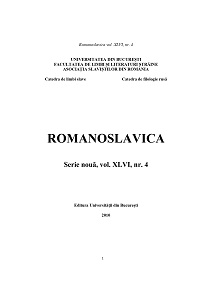Problema minorităţii istroromâne reflectată în literatura etnologică croată din perioada 1945-2009
The problem of the Istro-Romanian minority reflected in Croatian ethnological literature from 1945-2009
Author(s): Armand GuţăSubject(s): Customs / Folklore, Recent History (1900 till today), Sociolinguistics, South Slavic Languages, Cultural Anthropology / Ethnology, Ethnic Minorities Studies
Published by: Editura Universităţii din Bucureşti
Keywords: Istro-Romanian; Istria; Rumeri; Ethnologic and History Studies; Cultural Traditions; Bugarenje; Pust; Tri Kralj; Nowdays Cultural Surviving Strategies and Perspectives;
Summary/Abstract: The Istro-Romanian dialect is one of the three South-Danubian Romanian dialects, split off from the trunk of Common-Romanian about 700 years ago. Today it is spoken by a limited number of people in the Istria peninsula, namely, Croatia-Jeiăn (Ţejane), located in North-West of the town of Rijeka and in the region called Ţiţarija and in Sušnjevica placed on the south of Uţka Gora or Monte Maggiore, as well as in several poorly populated hamlets near Sušnievica (NoseloNovaVas, Sucodru-Jesenovik, Letaj, Brdo, Cosrtrţean, Dolinšţina, Zancovţ, Perasi and Brig), along the valley of the Raša river (Val D‘Arsa). Even the contemporary toponyms of the two above mentioned subregions and some villages argue for their Istro-Romanin origins practically the Istro-Romanian population had dissapered through assimilation or emigration. In the Middle Ages and the Modern times, Istro-Romanians were named cici, cirebiri by Slavic and Italian populations that surrounding them, but Istro-Romanians have defined themselves allways as Rumeri (lat. Romanus). Still preserving their etnic conscienceness, they consider themselves Romanians and even when they speak in Croatian language with Croatians and other foreigners, Istro-Romanians says with self-confidence, we are rumeri. The acculturation process of the Istro-Romanian minority from Croatia will continue because several motifs as: 1. They were no longer in contact with Romanian cultural milieu; 2. The absence of the educative and formative factors generated by missing of Istro-Romanian language in performance of the religious sermons and education will lead to the loss of the linguistic mark. The primary school from Ţejane is closed from lack of children in 1999, and the building is used in the present days as a repetition hall by the Ţejanski Zvonţari folkloric group the last cultural fortress of the community. Concerning these factors we think that the Istro-Romanian and Croatian bilingualism will soon replaced by the Croatian mono-linguistic phenomenon. After the 1945, the economic vectors were changed by the rapid industrialization of former Yugoslavia which caused the mass migration toward towns in searching for jobs and had accelerate the acculturation process of the Istro-Romanian group. We must reconsider the historic and demographic particularities which had transformed the Istria peninsula into a multicultural area where Italians, Croatians, Istro-Romanians, Germans and Slovenians lived together and influenced each other during the last five centuries. The Ţejane village is surrounded by 19 villages and hamlets and in each of those villages population spoke different sub-dialects of the Croatian and Slovenian languages. In eight of these hamlets the communication stream within the rural milieu is suspended because the lack of the receivers. The restrictive use of Istro-Romanian, especially in the last five decades since it was hardly an instrument of communication, especially for the young commuters employed in the factory of Rijeka, Opatja and the neighbourhood or for those who through mixed marriages, moved to other towns or villages is a process in full development even today. Through bilingual discourse, both old and young Istro-Romanian have yet a well-outlined linguistic awareness, being able in fact to prove that to speak on Jeianski, (a cuvinta po naşu, po jeianski) means something totally different from to speak on Croatian (a cuvinta po hârvaţki).
Journal: Romanoslavica
- Issue Year: XLVI/2010
- Issue No: 4
- Page Range: 11-24
- Page Count: 14
- Language: Romanian

